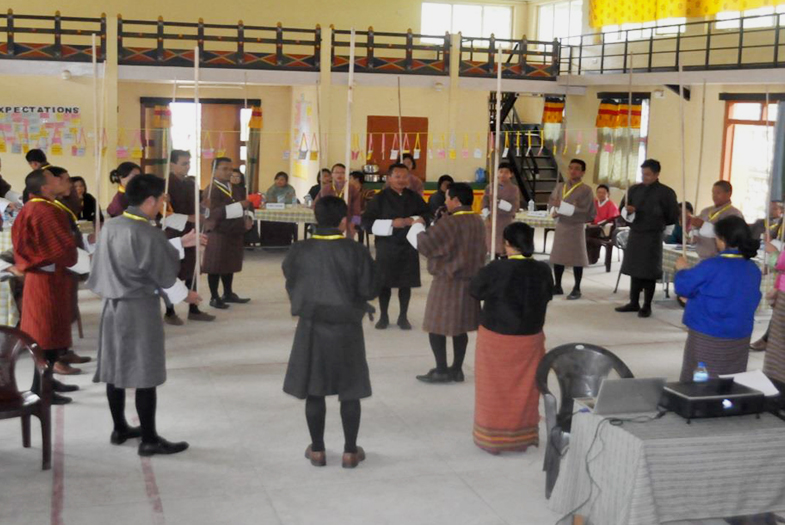
The Learning to Live Together (LTLT) Programme is being implemented in Bhutan by the Bhutan National Commission for UNESCO and the Bhutan Youth Development Fund (YDF), with the purpose of equipping teachers and young people with knowledge and skills to develop as global citizens and promote social cohesion in their societies.
Between 7 and 10 July, a National Capacity Building Workshop for Bhutanese Teachers on Global Citizenship Education was organized by the Bhutan National Commission for UNESCO with the support of the Korean National Commission. The program reached 42 participants including school administrators, teachers and youth from 28 schools hailing from 14 different districts.
During the workshop, several sessions based on the LTLT Programme were conducted. Mr. Udhim Subba, Vice Principal of Pakshikha Central School in Chukha, and trained facilitator of the LTLT Programme, led the sessions together with other colleagues. The sessions aimed to encourage teachers to analyze real life issues critically and to identify possible creative solutions. It motivated participants to build bridges of trust and work together, and help them to reflect about the importance of nurturing peace and respect for diversity.
The Bhutan Youth Development Fund (YDF), an organization that works to enable Bhutanese youth to realize their full potential as productive citizens, has also been implementing the LTLT Programme systematically. The YDF has been working with young people and implementing the LTLT educational framework in many different settings since 2013.
The Programme was successfully implemented in different schools from Thimphu, Tsirang, Gelephu, Chukha, Samtse, Trashigang and Pemagatshe, reaching more than 1.500 children, youth and members of the community.
One of the main problems amongst children between 12 and 18 years old in these schools is the difficulty in understanding themselves and the community they live in. Young people between 18 and 24 years old are often active and engaged in community building activities, but they also struggle to identify the needs of the society.
“The implementation of the program has impacted many young people and the people around them. It has brought harmony to the communities and also to people working with children and youth,” expressed Ms. Roma Pradhan, Program Coordinator.
The YDF, with the support of UNICEF, has been able to organize various LTLT workshops during the last year. They jointly organized a LTLT training for college students in Kanglung from the Trashigang District and also at the Juvenile Centre for Children in Conflict with the Law with the financial support from Save the Children’s Bhutan Country Office. YDF is the only NGO which is allowed to cater training for children at the Juvenile Centre in Chukha Dzongkhag.
The YDF also trained the Coordinators of the Young Volunteers In Action (Y-VIA) Youth Network of YDF and is in the process of forming a core trainers group in Bhutan on the LTLT. Using the LTLT manual, the YDF developed a tailored made curriculum for the Y-VIA network. It is a regular training YDF organizes every year for different groups in the various districts in Bhutan.
Ms. Roma Pradhan stated that the aim is to reach out more children and youth, train policy makers and heads of districts to participate in the trainings and ultimately reach the whole community. They are also exploring the possibility to take this training to the Schools in Bhutan by working with the Ministry of Education.
The Bhutan Youth Development Fund has signed a Memorandum of Understanding with Arigatou International Geneva to strengthen their work implementing the LTLT. It is expected that in 2016 a Training Workshop for facilitators on the use of the manual will be jointly conducted.
Special thanks to our partners in Bhutan for using the Learning to Live Together Programme to support the sound, healthy and spiritual development of children and youth in Bhutan through their different programs and activities.
